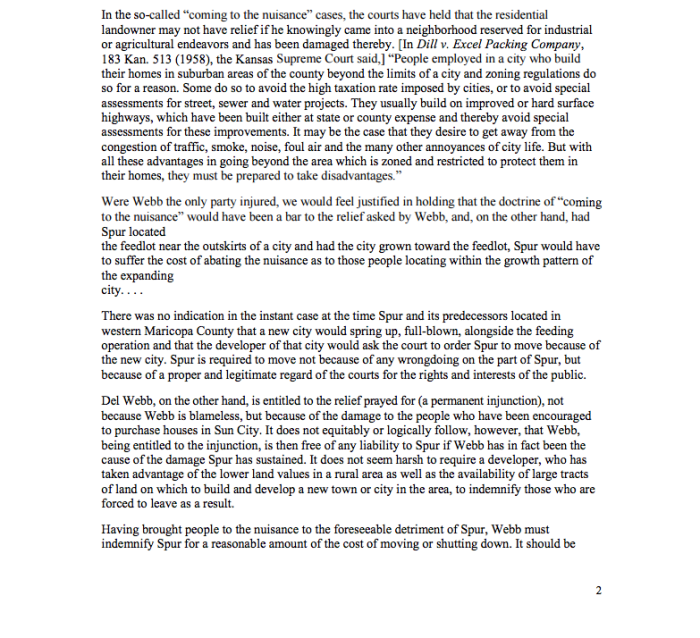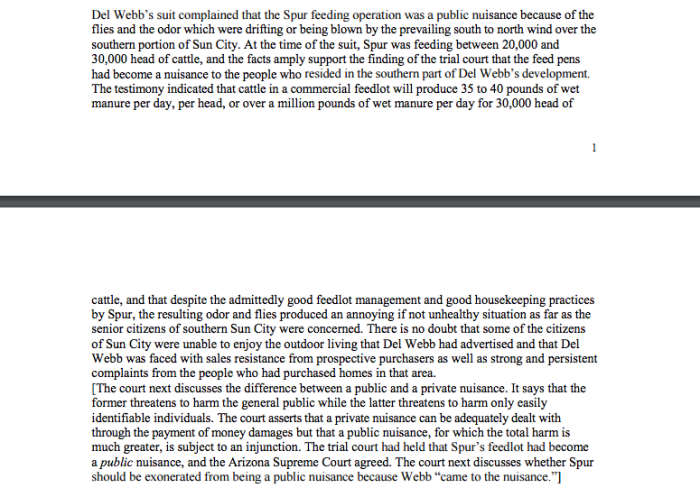Spur Industries Inc. v. Del E. Webb Development Co. is a landmark legal case that delves into the intricate complexities of contractual obligations.
This captivating narrative unfolds the legal battle between two prominent parties, shedding light on the fundamental principles governing contract law.
The dispute at the heart of this case revolves around a breach of contract, with each party presenting compelling arguments to support their claims. The court’s meticulous analysis of the legal issues involved provides valuable insights into the interpretation and enforcement of contractual agreements.
1. Legal Background

The lawsuit, Spur Industries Inc. v. Del E. Webb Development Co., arose from a dispute between two companies over the development of a parcel of land in Arizona. Spur Industries, the plaintiff, owned the land and had entered into a contract with Del E. Webb Development Co., the defendant, to develop the property into a residential subdivision.
The contract between the parties included a provision that gave Spur Industries the right to terminate the contract if Del E. Webb Development Co. failed to meet certain deadlines for the development of the property. Del E. Webb Development Co.
failed to meet the deadlines, and Spur Industries exercised its right to terminate the contract.
Del E. Webb Development Co. sued Spur Industries for breach of contract, arguing that Spur Industries had wrongfully terminated the contract. Spur Industries counterclaimed, alleging that Del E. Webb Development Co.
had breached the contract by failing to meet the deadlines.
Key Legal Principles, Spur industries inc. v. del e. webb development co
The legal principles that apply to this case include the following:
- The law of contracts, which governs the formation, interpretation, and enforcement of contracts.
- The doctrine of substantial performance, which provides that a party to a contract is not liable for breach of contract if the party has substantially performed its obligations under the contract.
2. Key Issues

The central legal issues that were disputed in the case were the following:
- Whether Del E. Webb Development Co. had breached the contract by failing to meet the deadlines for the development of the property.
- Whether Spur Industries had wrongfully terminated the contract.
3. Court’s Reasoning

The court found that Del E. Webb Development Co. had breached the contract by failing to meet the deadlines for the development of the property. The court also found that Spur Industries had not wrongfully terminated the contract because Del E.
Webb Development Co.’s failure to meet the deadlines was a material breach of the contract.
In reaching its decision, the court relied on the following legal principles:
- The law of contracts, which governs the formation, interpretation, and enforcement of contracts.
- The doctrine of substantial performance, which provides that a party to a contract is not liable for breach of contract if the party has substantially performed its obligations under the contract.
4. Impact of the Decision

The court’s decision had a significant impact on the parties involved. Spur Industries was awarded damages for Del E. Webb Development Co.’s breach of contract. Del E.
Webb Development Co. was also ordered to pay Spur Industries’ attorney’s fees.
The decision also has implications for other cases involving the law of contracts and the doctrine of substantial performance. The decision provides guidance to courts on how to interpret and apply these legal principles in future cases.
FAQ Resource: Spur Industries Inc. V. Del E. Webb Development Co
What was the primary legal issue in Spur Industries Inc. v. Del E. Webb Development Co.?
The central legal issue was whether the defendant, Del E. Webb Development Co., breached a contractual obligation to the plaintiff, Spur Industries Inc.
How did the court resolve the dispute?
The court ruled in favor of the plaintiff, finding that the defendant had indeed breached the contract.
What was the significance of the court’s decision?
The court’s decision clarified the legal principles governing contractual obligations and provided guidance for future cases involving similar disputes.